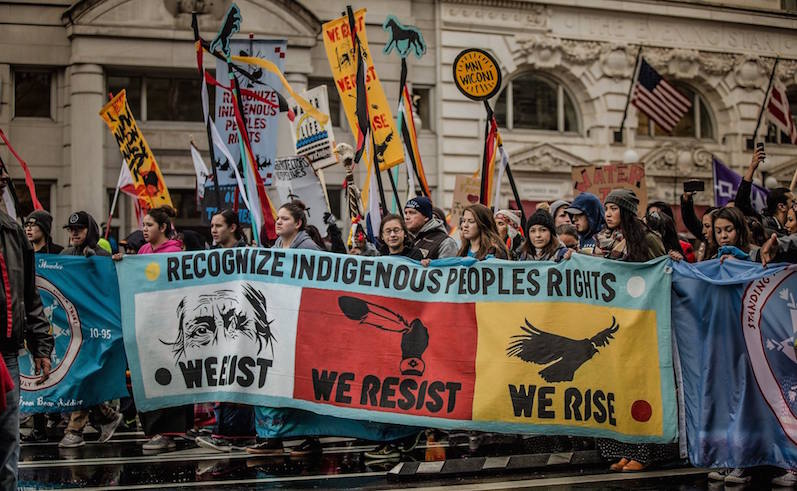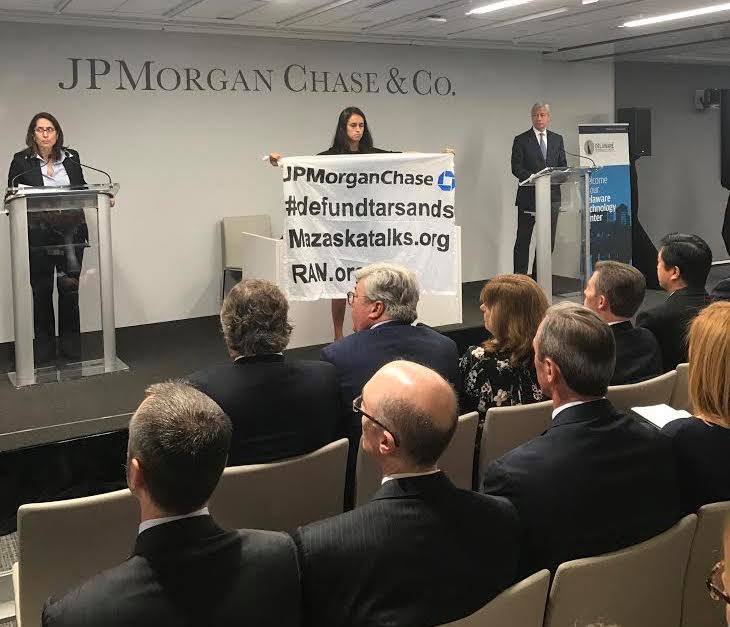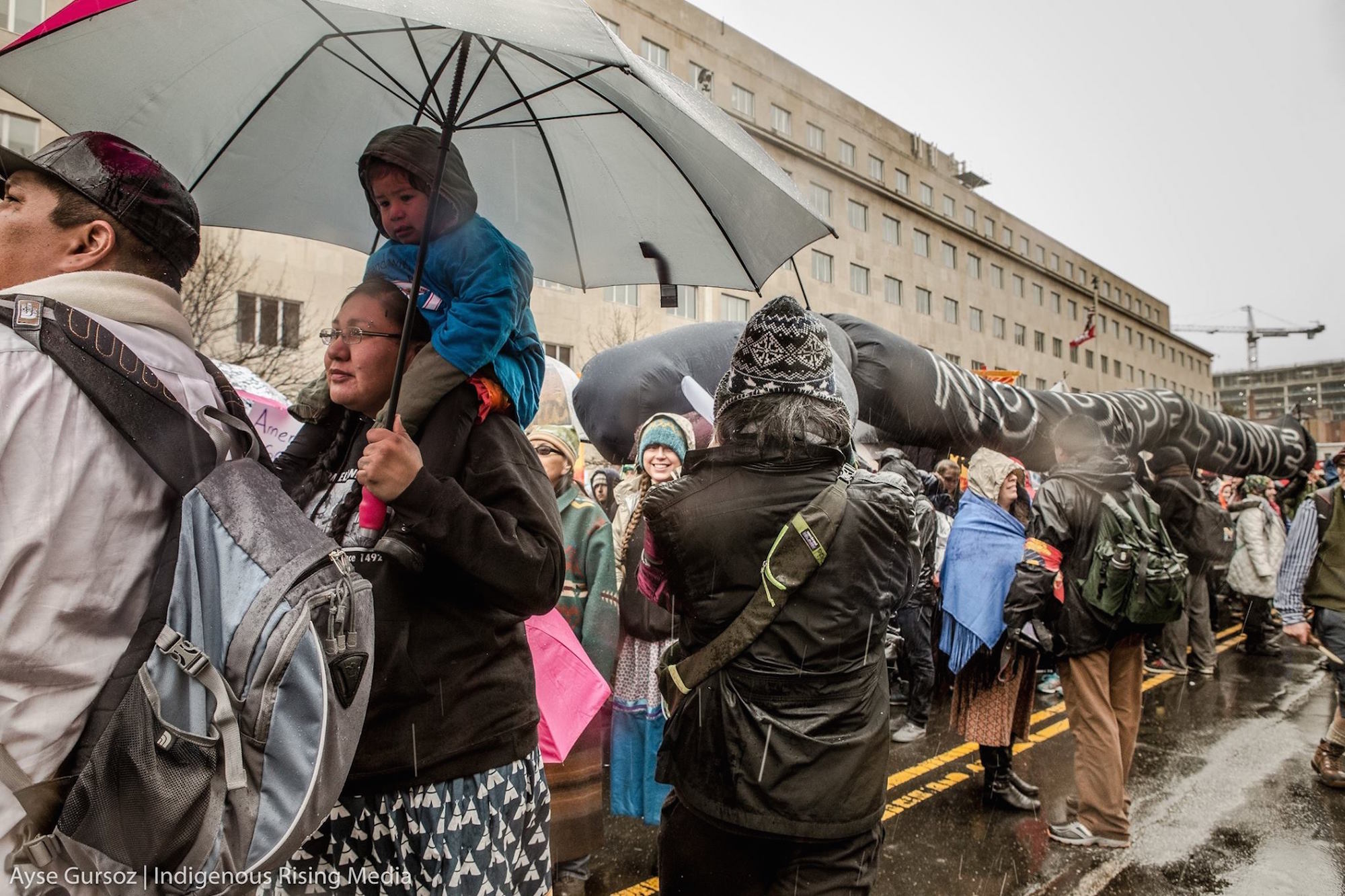It’s DAPL all over again, and it’s happening right under our nose.

UPDATE: 28 major banks warned not to finance Trans Mountain pipeline expansion
This week, over 20 Indigenous and environmental organizations delivered an open letter to 28 major banks, calling on them to back away from funding the Trans Mountain pipeline expansion project (TMEP).
“Mark my words, Kinder Morgan’s Trans Mountain pipeline expansion project will never see the light of day,” said Grand Chief Stewart Phillip, President of the Union of the BC Indian Chiefs.
Here are 5 things you need to know about Trans Mountain:
1. More than 120 First Nations and Tribes comprising the Treaty Alliance Against Tar Sands Expansion oppose Trans Mountain. The Tsleil-Waututh Nation, The Coldwater Indian Band, and the Squamish Nation are among the First Nations tackling the pipeline project in the courts, citing environmental and health concerns —on top of the fact that they haven’t properly been consulted. Sound familiar?
Rueben George, of the Tsleil-Waututh Sacred Trust Initiative, said to the Vancouver Sun:
“These tankers and pipelines and the port behind us. … What they’re doing is not good. It goes against our laws on our land and water. That’s why we’re saying No. We’re not going to allow this to happen.”
Chief Serge Simon of the Mohawk Council of Kanesatake, said at the TD Bank shareholder meeting:
“Indigenous opposition from Quebec to British Columbia to North Dakota will stop the Kinder Morgan oil pipeline.”
2. Canada’s Trans Mountain Pipeline expansion would nearly triple its existing capacity from 300,000 to 890,000 barrels of crude tar sands oil per day — making it far bigger in capacity than the Dakota Access pipeline and the proposed Keystone XL pipeline in the U.S.
Clayton Thomas-Müller of the Mathias Colomb First Nation, and Campaigner at 350.org says:
“The extraction and production of tar sands oil not only spreads climate chaos across the planet, it has been killing Dené, Cree and Métis people in Northern Alberta through cancer and the poisoning of their water and food systems. Banks that fund tar sands infrastructure like Trans Mountain are writing death warrants for our people and the world at large.”
3. It already has a disgraceful track record. The existing Trans Mountain pipeline has 82 leak incidents under its belt, including four major oil spills.
Hannah McKinnon of Oil Change International said:
“New tar sands infrastructure is incompatible with a safe climate, the world is in a deep hole and the first thing we need to do is stop digging. This pipeline is the epitome of risky: First Nations don’t want it, the Province of British Columbia doesn’t want it, the climate can’t afford it, and the sector that it is being built for doesn’t need it.”
4. Banks -STILL- haven’t learned their lesson from DAPL, and are lining up to invest in the project. Just a month ago, Citi Chairman Michael O’Neill, when confronted with Indigenous Water Protectors taking action at the Citi annual shareholder meeting, said: “We wish we could have a do-over on this.” Kinder Morgan is lining up banks in the next few weeks to get a credit card for $5 billion Canadian to fund Trans Mountain. This is banks’ chance at a do-over, and many of them are blowing it.
These 14 banks are selling shares in Trans Mountain and other Kinder Morgan assets :
Bank of America, Bank of Montreal, Barclays, Canadian and Imperial Bank of Commerce, Credit Suisse, Deutsche Bank, JPMorgan Chase, Mitsubishi UFJ Financial Group, Mizuho Financial Group, National Bank of Canada, Royal Bank of Canada, Scotiabank, Société Générale, and TD Bank)
These 14 banks are participants in current and past Kinder Morgan revolving credit facilities: BayernLB, BBVA, BNP Paribas, BPCE/Natixis, Citigroup, Crédit Agricole, DNB ASA, ING, Morgan Stanley, Regions Bank, Sumitomo Mitsui Financial Group, SunTrust, UBS, and Wells Fargo.
Tom BK Goldtooth, Executive Director, Indigenous Environmental Network said:
“Our prophecies tell us that life on Mother Earth, as we know it, is in danger and coming to a great transformation. The time is now for banks to divest from an economy based on industrial extraction, production and combustion of fossil fuels and its environmentally risky transportation infrastructures. Investment policy changes are urgently needed that recognize the health and vitality of Earth’s living systems, ecological and social well-being and the rights of Indigenous Peoples.”
5. The public opposes Trans Mountain. A recent survey found that 50% of British Columbia residents oppose the pipeline project and only 22% support it. Amongst those more informed on the details of the project, 70.9% are opposed.
Indigenous Peoples and allies are organizing against TMPEC, and are calling on banks to defund tar sands extraction and back away from funding Trans Mountain.
Jacqueline Fielder of Mazaska Talks said:
“Until banks honor the right to Free Prior and Informed Consent of indigenous people — including the Dene, Cree, Metis, and Athabasca Chipewyan First Nation — we will continue to call on municipal and foreign governments to divest from these banks.”
Eriel Deranger, Director with Indigenous Climate Action said:
“We are collectively responsible for achieving climate stabilization in our lifetime. We must challenge the systems that brought us to where we are, or suffer the consequences of our inaction. Tar sands development, and all of its associated infrastructure, are a byproduct of an antiquated economic system that propagates and supports climate chaos while devaluing and dehumanizing Indigenous rights and culture. We must not let money, and the banks that control our money, dictate our futures any longer. It’s time to demand real change and action on climate today.”
Interested in taking action? Tell JPMorgan Chase, the top Wall Street banker of tar sands, not to fund Trans Mountain.

